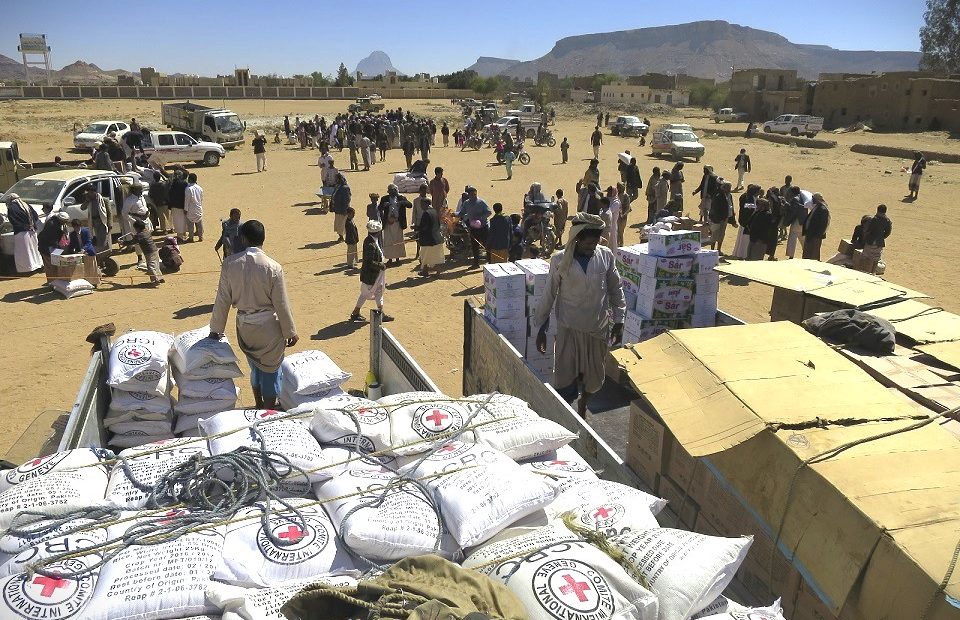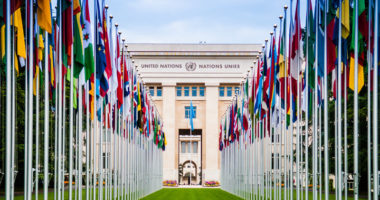The year 2023 marked a significant shift in how the EU makes space for humanitarian action in the design of sanctions, a foreign policy tool that has traditionally raised concerns due to its potential to hinder impartial humanitarian efforts. Mounting evidence and advocacy on the need for sanctions to include robust humanitarian safeguards to comply with international humanitarian law requirements resulted in the December 2022 adoption of UN Security Council Resolution 2664, which explicitly excludes humanitarian action from UN financial sanctions, initiating a transformative approach towards incorporating humanitarian exemptions in sanctions design.
In this post, ICRC Advisers Sophie Huvé, Guillemette Moulin and Tristan Ferraro explore progress made in recent years at the EU level, as well as the remaining challenges. They suggest that the EU’s recent policy changes, aligning with UN Security Council Resolution 2664, should be set as a default in future sanctions designs, ensuring that humanitarian action is protected and facilitated within the framework of international humanitarian law (IHL).
The ICRC does not take a position on the legitimacy or necessity of sanctions, part of states’ sovereign foreign policy toolbox. However, sanctions – whether adopted at the UN, regional or domestic level – have triggered increasing concerns over the years due to their adverse effects on principled humanitarian action. These concerns primarily stem from the complex legal, logistical, and financial challenges that sanctions can pose to impartial humanitarian organizations such as the ICRC, including their contradiction with some key rules of IHL, notably those governing humanitarian activities.
This underlying tension between sanctions, IHL and humanitarian action has been significantly mitigated at the UN level with the adoption of UN Security Council Resolution 2664 (hereafter UNSCR 2664) in December 2022. This resolution explicitly excludes humanitarian action from the scope of current and future UN financial sanctions,[1] marking a shift towards well-framed[2] and standing humanitarian exemptions as the new standard in the design of such sanctions. In the first part of 2023, the EU swiftly transposed the new “UNSCR 2664 exemption” in all their UN-based regimes.
While UNSCR 2664 does not mandate transposition beyond the confines of UN financial sanctions (i.e., does not require states or regional organizations to adopt exemptions in non-UN sanctions), its inspirational value sets in motion significant changes in the approach of many states and international organizations, which followed and replicated this UN-established exemption in their autonomous sanctions regimes.
Progress observed in 2023 at the EU level marks a particularly important development. Until the adoption of UNSCR 2664, only three humanitarian exemptions to asset freeze restrictions existed, including two in UN-based sanctions regimes. By the end of 2023, 27 out of 39 EU regimes, both UN-based and autonomous regimes, included a humanitarian exemption based on 2664 language to assets freeze measures.
Why is this development important for impartial humanitarian action?
The EU has increasingly resorted to sanctions in the past decade, building additional measures into existing UN-based regimes, but also adopting purely autonomous sanctions frameworks. This has been accompanied by efforts to ensure that these measures are interpreted harmoniously and implemented consistently across its 27 members States, with a view of strengthening their effectiveness. EU member States have also taken new steps at national level to address the legal and policy questions arising from sanctions implementation, including by expanding their sanctions units, disseminating guidance and enforcing the measures through their judiciary.
These elements show that sanctions are increasingly becoming a key component of EU’s foreign policy. Therefore, in contexts where EU sanctions apply, it is crucial to ensure that they are designed in a way that does not impede principled humanitarian action. In short, sanctions must embed robust mechanisms of safeguard in the form of well-framed and standing humanitarian exemptions; this is the only way to ensure that they comply with IHL requirements.
Looking back: the EU’s previous reluctance towards humanitarian exemptions
Progress made in 2023 would have been difficult to imagine a year ago, given the EU’s preference to safeguard humanitarian action from adverse effects of sanctions measures only through derogations which require humanitarian organizations to seek and obtain ad hoc authorizations from a specific sanctioning authority[3] before undertaking any humanitarian activities that could be interpreted as contrary to sanctions regimes. Derogations inherently contradict IHL and pose many practical and operational problems.[4]
Despite having the leeway to do so, EU sanctions designers were reluctant to introduce humanitarian exemptions into their autonomous sanctions regimes, for two main reasons. The first was the skepticism of sanctions imposers that their measures have a negative impact on principled humanitarian action, questioning therefore the relevance and utility of including exemptions in their sanctions frameworks. The second was the fear that these exemptions, if adopted, would increase the risks of sanctions circumvention and aid diversion, undermining the effectiveness of the measures to constrain the access of listed individuals and entities to financial and economic resources and thus subverting the intended goals of their sanctions regimes. The advocacy of humanitarian organizations and think tanks, bringing evidence of the impacts of sanctions on humanitarian action, putting in perspective the perceived risks of abuse of exemptions, and including IHL into the sanctions equation, has been crucial in overcoming the major concerns towards humanitarian exemptions.
Humanitarian exemptions were not really part of the EU sanctions regimes toolbox until UNSCR 2664 triggered two key moments of change in the position of EU policymakers.
First moment of change in EU sanctions: UN-based and UN-EU mixed regimes
In early 2023, the EU Member States fulfilled their obligation under Article 25 of the UN Charter by incorporating the UNSCR 2664 exemption into the assets freeze measures of its seven “UN-based” sanctions regimes – those originally imposed by the UN and simply transposed into EU law without additional EU restrictions.[6] A few weeks later, the EU went even further, extending the transposition of the UNSCR 2664 exemption into its eight “UN-EU mixed regimes” – those which build upon existing UN sanctions with additional EU listings.[7]
The EU’s mandatory implementation of UNSCR 2664 exemption was swift, and meticulous in mirroring all its legal parameters. Yet, what stood out was the EU’s decision to apply this exemption to the entirety of its UN-EU mixed regimes, including to the EU additional measures while there was only an obligation to do so for the UN part. Simply put, the EU included a humanitarian exemption in eight of its partially autonomous regimes, something never done before.
The reason for doing so was the necessity to ensure uniformity and avoid the creation of a two-tier system within its UN-EU mixed regimes. The EU aimed to create a clear, predictable legal environment, allowing humanitarian organizations, but also their private sector partners, to work without having to differentiate between EU and UN measures applicable in a same context.[8] This move became all the more crucial as an exemption limited to only UN listings would have undermined the intent and purpose of UNSCR 2664, by hampering the predictability and legal certainty the resolution intended to provide to humanitarian organizations and their partners.
Second moment of change: EU autonomous sanctions
In the spring of 2023, the EU’s inclusion of the UNSCR 2664 exemption in the UN-EU mixed regimes raised hopes for a similar approach and the inclusion of a “horizontal” exemption across all EU “purely” autonomous regimes. However, the path to adopting humanitarian exemptions in these regimes turned out to be more complex.
As previously mentioned, the obligation grounded in UN Charter law to transpose the UNSCR 2664 exemption did not extend beyond the confines of UN sanctions. Thus, any refinement in the design of EU autonomous regimes was the sole and consensual decision of EU Member States. And, as described above, EU Member States traditionally favored ad hoc derogations over exemptions, the latter having been adopted only in three exceptional circumstances.[9]
Consensus on a “horizontal solution” within the EU Council proved challenging, and the EU Member States turned to a case-by-case approach, evaluating the benefits and risks of humanitarian exemptions for each specific regime. As a result, several sanctions regimes were renewed in 2023 without including humanitarian exemptions, with the notable exceptions of Iran, Moldova and Syria, three cases justified by particular circumstances and only including carveouts limited in their temporal and personal scope.[10]
A paradigm shift occurred in autumn 2023. In October, the EU introduced new sanctions frameworks for Niger and Sudan, including comprehensive, standing humanitarian exemptions that mirrored and even expanded upon UNSCR 2664’s personal scope. This marked the first time the EU applied such comprehensive exemptions in its autonomous regimes, responding therefore positively to the call made by impartial humanitarian organizations, like the ICRC, over several years. Subsequently in November, the EU amended 10 existing autonomous regimes to incorporate similar exemptions[11], covering key humanitarian contexts in countries like Lebanon, Myanmar, and Venezuela.
This significantly increased the number of EU sanctions regimes with a UNSCR 2664 model of humanitarian exemption to 27 out of 39 (including those based and building on UN sanctions). While this does not exactly equate to a “horizontal solution”, this major development represents another step towards making humanitarian exemptions the new standard to safeguard principled humanitarian action and reaffirming UNSCR 2664’s inspirational value.
The road ahead: progress and challenges
This progress in EU sanctions policy extends beyond formal legal adjustments. It has several practical, tangible benefits for impartial humanitarian organizations. To begin with, it allows and facilitates the involvement of the private sector (banks, suppliers, transporters) in humanitarian activities without them being at risk of breaching sanctions, in turn helping overcome overcompliance and de-risking. It should also ease the funding of humanitarian operations in sanctions contexts, because of the reassurance provided to donors. Last but not least, it offers critical legal protection for humanitarian personnel, vital in contexts where they must engage and work with various listed individuals and entities to deliver aid effectively. This increased legal certainty will help overcome cases of self-restraint by all actors concerned.
Despite this progress, four main challenges remain to be addressed.
First, there are still EU autonomous regimes applicable to areas where impartial humanitarian organizations operate that do not contain any humanitarian exemptions, or only a temporary exemption set to expire. The inclusion of a lasting/standing and well-framed humanitarian exemption in the Syria sanctions regime will in that sense be a main priority, as well as for cross-cutting regimes like the EU global human rights regime or the CT sanctions regime.
Second, some regimes contain a humanitarian exemption covering a restricted category of organizations.[12]. To cover the complex ecosystem of humanitarian organizations operating in conflict settings, the EU may want to extend the personal scope of these limited exemptions.
Third, ensuring a consistent and harmonious interpretation and implementation of humanitarian exemptions across 27 EU Member States will be key to ensure that they are helpful and effective, in practice. Sanctions reform will have little impact on de-risking and overcompliance policies without proper outreach. Policymakers need to get the private sector (suppliers, banks, firms) to feel confident in their interpretations of sanctions and exemptions. This will require the drafting of clear guidance and the promotion of exemptions among private sector actors, among donors, and any others involved.
Fourth, financial sanctions are not the only sanctions-related challenge that can impede principled humanitarian action. Many other sanction measures, such as arms embargoes or export restrictions, can produce logistical, financial, and legal hurdles slowing the humanitarian response or increasing its cost. Advocacy for humanitarian exemptions to be included in these types of sectoral measures might also be necessary. This will be key to ensuring that in a same context, the progress made to facilitate humanitarian activities through exemptions to financial sanctions are not undermined by a lack of carveouts to other restrictions.
Conclusion
By the end of 2023, humanitarian exemptions have seemingly become the “default setting” to safeguard humanitarian action from the adverse impacts of EU sanctions, which indicates a fundamental – and welcomed – shift in EU sanctions policy and two potential trends. First, this journey, from derogations to exemptions, demonstrates a slow but undeniable acknowledgement that the latter are the best and most effective solution to ensure that EU sanctions do not stand in the way of delivering humanitarian assistance. Second, looking ahead, EU sanctions designers may find it increasingly challenging to justify sanctions imposition without incorporating humanitarian exemptions, now fully part of their sanctions toolbox, especially as the EU portrayed exemptions as participating in the “full adherence to international law in the EU’s sanctions policy”. [13]
To consolidate recent achievements, EU stakeholders should consider carving out in stone that EU sanctions will include well-framed and standing humanitarian exemptions as a default setting aligning with the precedent set by UNSCR 2664.
[1] It applies to asset freeze restrictions, that are always articulated in two parts: the freezing of assets of listed individuals and entities, and the prohibition to make resources available to them.
[2] “Well-framed” humanitarian exemption are those encompassing all the exclusively humanitarian activities by humanitarian actors qualifying as impartial humanitarian organizations for the purposes of IHL.
[3] A “national competent authority”, in the case of EU sanctions regimes
[4] On the legal and practical issues raised by the use of derogations, see Ferraro T. International humanitarian law, principled humanitarian action, counterterrorism and sanctions: Some perspectives on selected issues. International Review of the Red Cross. 2021;103(916-917):109-155. doi:10.1017/S1816383121000965
[5] Council of the EU, Humanitarian Assistance and International Humanitarian Law – Council Conclusions, 14487/19, 25 November 2019, para. 8; Council of the EU, Council Conclusions on EU External Action on Preventing and Countering Terrorism and Violent Extremism, 8868/20, 16 June 2020, paras 15, 27; Council of the EU, EU Priorities at the United Nations and the 75th United Nations General Assembly – Council Conclusions, 9401/20, 13 July 2020, para. 12. Reference on compliance with international law and on the preservation of humanitarian activities can also be found in EU framework documents on sanctions: see Council of the EU, Basic Principles on the Use of Restrictive Measures (Sanctions), 10198/1/04 REV 1, 2004, para. 6; Council of the EU, Guidelines on Implementation and Evaluation of Restrictive Measures (Sanctions) in the Framework of the EU Common Foreign and Security Policy, 11205/12, 2012, para. 9; European Commission, Commission Guidance note on the provision of humanitarian aid in compliance with EU restrictive measures (sanctions), C(2022) 4486 final, 30.6.2022.
[6] On February 14, 2023, the EU adapted its legal framework to incorporate humanitarian exemptions in six specific sanctions regimes, namely those concerning Somalia, Central African Republic, Yemen, Haiti, Iraq, and measures related to the assassination of former Lebanese Prime Minister Rafiq Hariri. The EU used transversal legal acts to amend a variety of regimes (see Council Decision 2023/338 and Council Regulation 2023/331).
[7] This extension first impacted eight such mixed regimes, involving countries like North Korea, the Democratic Republic of Congo, Iran, Libya, Mali, South Sudan, Sudan, and the groups Al-Qaeda and Islamic State. The exemptions clauses were introduced through Council Decision 2023/726 and Council Regulation (EU) 2023/720, that were published on 03.04.23. The EU used again transversal acts to amend these sanctions regimes. Interestingly, the EU completed the transposition process by including few months later a humanitarian exemption in the mixed regime applicable to Guinea Bissau. The adoption of a UNSC resolution 2664 exemption was not per se mandatory, since UN restrictions only include travel bans, and that the asset freeze restrictions had been introduced autonomously by the EU. Humanitarian action: EU introduces further exceptions to sanctions to facilitate the delivery of assistance – Consilium (europa.eu)
[8] See press release: Humanitarian action: EU introduces exemptions to sanctions to facilitate the delivery of assistance – Consilium (europa.eu)
[9] Before 2023, only three specific and limited humanitarian exemption had been granted: the exemption introduced for purchase of oil in Syria (in 2016), and, in April 2022, the adoption of two humanitarian exemptions applicable to financial and trade sanctions in sanctions in relation to the situation in Ukraine..
[10] First, the EU included in February a 6-month humanitarian exemption in EU Syria autonomous sanctions. The exemption has been renewed twice since then and is now officially running until 1 June 2024. the scope of the exemption was, based and building on UNSCR 2664, benefitting to a wide range of actors and activities. However, the temporary nature of the carveout limits its protective value and prevents a proper alignment with UNSCR 2664’ standard. The other notable exception to the “stillstand” period is the introduction of “limited”, narrowly framed humanitarian exemptions in sanctions regime applicable to the situation in Moldova, and to the restrictive measures “in view of Iran’s military support of Russia’s war of aggression against Ukraine”. the 2 exemptions cover only a limited range of actors (mostly UN agencies, the IFRC and the ICRC), de facto excluding major NGOs otherwise covered by UNSCR 2664.
[11] See Council Decision (CFSP) 2023/2686 and Council Regulation (EU) 2023/2694
[12] See for instance the humanitarian exemption included in EU sanctions in relation to the situation in Moldova, that covers “organisations and agencies which are pillar-assessed by the Union and with which the Union has signed a financial framework partnership agreement on the basis of which the organisations and agencies act as humanitarian partners of the Union”, (Decision (CFSP) 2023/891of 28 April 2023 concerning restrictive measures in view of actions destabilising the Republic of Moldova, Art.2 para.7).
[13] See communication: Humanitarian action: EU introduces further exceptions to sanctions to facilitate the delivery of assistance – Consilium (europa.eu)
See also
- Helen Durham & Christopher Harland, Carve-out in Kabul: hard won resolution lifts humanitarian roadblock in Afghanistan, February 3, 2022
- Naz K. Modirzadeh and Dustin A. Lewis, Humanitarian values in a counterterrorism era, Humanity in War podcast








Comments